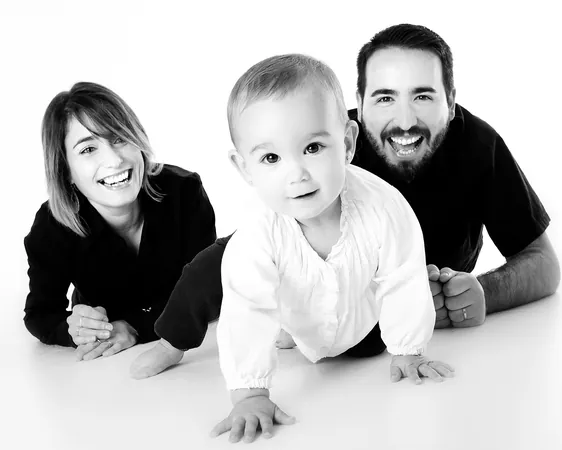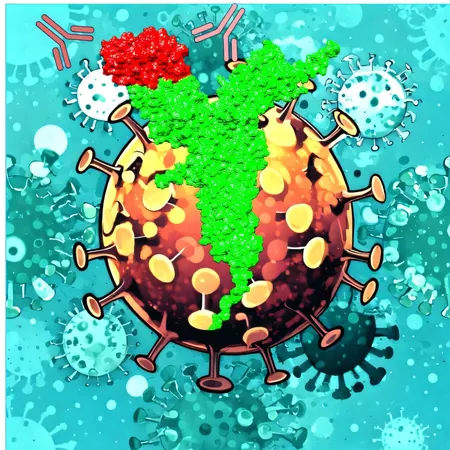
Groundbreaking RSV Vaccine Program Prevents Hospitalizations for Over 500 Families - Is Your Baby Protected?
2025-03-28
Author: Ming
Groundbreaking RSV Vaccine Program Prevents Hospitalizations for Over 500 Families - Is Your Baby Protected?
In a groundbreaking Australian-first study, researchers have demonstrated the remarkable effectiveness of a new immunization against respiratory syncytial virus (RSV) for infants, achieving an impressive 90% reduction in hospitalizations. This pioneering program has kept more than 500 families in Western Australia (WA) from facing the emotional strain of hospital stays for their babies.
Conducted by the Wesfarmers Center for Vaccine and Infectious Diseases at The Kids Research Institute Australia, the REVIVE Study focused on RSV-related hospital admissions following the launch of an immunization initiative that provides infants with a long-lasting monoclonal antibody known as nirsevimab. RSV is a major threat to young children, affecting their airways and lungs, and is responsible for over 3.6 million hospitalizations globally each year.
Dr. Ushma Wadia, a leader in the research, emphasized the dedication of WA researchers to combatting RSV. "Last year, the WA Department of Health made significant strides as the first Australian state to offer a free immunization program for all babies born during the winter months, and its success has been outstanding."
With over 24,000 doses of nirsevimab administered between April and September of last year, the program covered 85% of newborns, along with 66% of a 'catch-up' cohort of infants. "Thanks to the support of various organizations and collaborations with WA Health, we have become the first location in the southern hemisphere to showcase such a significant reduction in RSV-related hospitalizations," Dr. Wadia stated.
According to the study, published in the Journal of Infection, babies who received nirsevimab were also 60% less likely to need oxygen or respiratory assistance when hospitalized due to RSV, illustrating the vaccine’s capacity not just to prevent hospitalization but also to mitigate the severity of illness in those affected.
Carrick Robinson, CEO of the Perth Children's Hospital Foundation, hailed the study as a beacon of hope for the future of child healthcare. "These results indicate a considerable decrease in RSV hospital admissions, and WA is proudly leading the way in safeguarding our youngest and most vulnerable. This advancement not only alleviates pressure on hospitals but spares families from the anxiety and stress of hospital visits."
Professor Chris Blyth, who leads the Wesfarmers Center, pointed out the study's broader implications, stating, "The findings from the REVIVE Study are significant not just nationally, but globally. The data correlates with findings from similar research in the northern hemisphere and can guide vaccine policies worldwide, particularly in developing nations where RSV poses a severe health risk.”
The success of WA's program has inspired the launch of a national, $174.5 million RSV immunization initiative aimed at protecting all pregnant women and newborns, with hopes of preventing up to 10,000 Australian babies from being hospitalized each year.
For over 20 years, researchers at the Wesfarmers Center have engaged in global vaccine studies, making strides in the development of effective and safe RSV immunizations. The tangible outcomes from this research are not just a triumph for scientists but a vital step forward for families across Australia and beyond.
Parents are now urged to inquire about this groundbreaking immunization program—could your baby be next to benefit from such vital protection?



 Brasil (PT)
Brasil (PT)
 Canada (EN)
Canada (EN)
 Chile (ES)
Chile (ES)
 Česko (CS)
Česko (CS)
 대한민국 (KO)
대한민국 (KO)
 España (ES)
España (ES)
 France (FR)
France (FR)
 Hong Kong (EN)
Hong Kong (EN)
 Italia (IT)
Italia (IT)
 日本 (JA)
日本 (JA)
 Magyarország (HU)
Magyarország (HU)
 Norge (NO)
Norge (NO)
 Polska (PL)
Polska (PL)
 Schweiz (DE)
Schweiz (DE)
 Singapore (EN)
Singapore (EN)
 Sverige (SV)
Sverige (SV)
 Suomi (FI)
Suomi (FI)
 Türkiye (TR)
Türkiye (TR)
 الإمارات العربية المتحدة (AR)
الإمارات العربية المتحدة (AR)